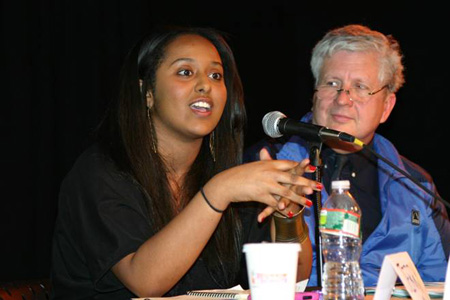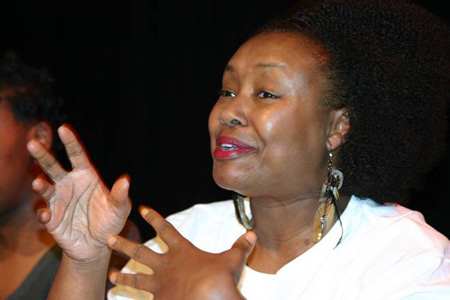Emersonians discuss Trayvon Martin
Students, faculty, and staff came together last week to discuss the Trayvon Martin case: the implications it’s had on race relations nationally, how it relates to race relations at Emerson, and the media’s coverage of the case and other issues of race.
The Office of Diversity and Inclusion co-sponsored the panel discussion with the faculty Ethics Circle titled “Just Who Exactly Should Stand Their Ground: The Ethics and Justice of the Trayvon Martin Case.” Panelists were Associate Professor of Journalism Jerry Lanson, students Jessica Joseph ‘13, and Muna Salah Moushien ‘14, and adjunct faculty member Liana Asim. Visual and Media Arts Professor Tom Cooper moderated the panel.

Lanson, who teaches journalism ethics and also blogs about that topic at the Huffington Post, discussed how the Martin case took so long to gain traction in the mainstream media. He reflected on the fact that three black reporters were the first to report the story, stayed with it, and made it go national. However, it wasn’t reported nationally until about a month after the shooting. “Why were the news media asleep at the wheel?” asked Lanson. According to him, part of it has to do with “institutional racism” in American newsrooms. Fewer than 13 percent of editorial employees are minorities, he said, and “the makeup of the newsroom does influence its mindset.”
Moushien, who is an African American broadcast journalism major minoring in political communications at Emerson, said she was grateful for the opportunity to talk about race, which she said is “a topic no one wants to talk about.” She told the audience that when she first heard about the Martin case, she didn’t think that it would become such a national controversy because she could name a number of cases of black men who had been profiled and killed that didn’t result in the same kind of media storm. She looks at the Martin case, “as sort of a last straw,” she said and the rallies, protests and general outrage across the country as the reasons the case continues to be covered.
Incoming EBONI president and a junior Marketing Communication major, Joseph talked about how EBONI (Emerson’s Black Organization with Natural Interests), has tried to take on the Trayvon Martin cause. The group sponsored a day at Emerson for people to wear hoodies in solidarity with Trayvon and hosted a panel event to discuss the Martin case and another recent media story, the Kony video made by the nonprofit Invisible Children. EBONI’s goal is to make sure Emerson is kept aware of the happenings in the Martin case, she said, and to that end, they’ve started a Facebook group for Emersonians interested in the case that’s updated regularly.

Asim, whose husband, Jabari Asim, also teaches in the Writing, Literature and Publishing Department at Emerson, talked about her experiences as the mother of five African American children, four of them male. She recounted a story about her own “hoodie moment” when her teenage son was briefly being mistaken for a young black man who’d committed a crime and was surrounded by police at a bus stop.
Asim also said that she’s had to constantly “fight the narrative” with her children—the perception that young black men are likely criminals—by telling them they are wonderful and boosting their confidence, while at the same time making them aware of the way people think and teaching them how to be cautious. Tragedies like the Martin case happen when people don’t see the humanity in each other, she said. “Zimmerman didn’t see that humanity in Trayvon.” She then asked the audience to stand and say “the infinite in me sees the infinite in you” to one another, a step, she said, towards understanding each other’s humanity.
Categories